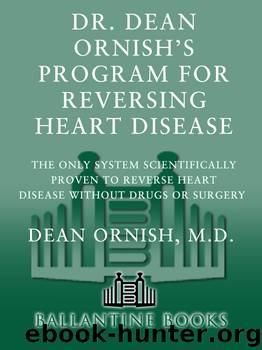Dr. Dean Ornish's Program for Reversing Heart Disease by Ornish Dean

Author:Ornish, Dean. [Ornish, Dean]
Language: eng
Format: epub
ISBN: 978-0-307-76367-9
Publisher: Random House Inc.
Published: 2013-12-10T16:00:00+00:00
SALT
Salt is not as big a health problem as many people believe. Several cookbooks professing to be “heart-healthy” have appeared with recipes that, while low in salt, include seven or eight egg yolks and a half-pound of butter!
Salt affects your health only to the degree that it causes your blood pressure to increase. Less than one fourth of people who have high blood pressure are “salt-sensitive.” If you don’t have high blood pressure, then you don’t have to limit your salt intake drastically.
Your body maintains a precise concentration of salt, so when you eat salt, your body tends to retain water in order to dilute the salt to keep it at a constant concentration. All other things being equal, when you increase the amount of volume (water) in a closed system (your body), the pressure increases. Because salt causes water retention, it was once thought that eating salt would cause everyone’s blood pressure to increase. Most people, though, are able to excrete the extra salt and water in their urine, unless they have congestive heart failure or kidney disease. If you do, then you will benefit from restricting your salt intake. And if you have high blood pressure, you might try decreasing your salt intake to see if it helps to bring your blood pressure down. If so, then you are a “salt-sensitive” person. (Some evidence suggests that blacks may be more salt-sensitive than whites.) Otherwise, you can add a little to your food.
Most of us would benefit from reducing the salt content of our diet, at least to some extent. A little salt helps to bring out the flavor of foods and makes a lowfat diet much more palatable, but a lot tends to mask it. Better to add a little salt to your food so it tastes good than to add fat.
Recent evidence indicates that other forms of sodium, such as sodium bicarbonate (baking soda), monosodium glutamate, and so on, have little effect on blood pressure even in salt-sensitive individuals. It appears that salt, not sodium, is the main culprit.
However, monosodium glutamate, or MSG, which is used widely (especially in some Chinese restaurants) as a flavor enhancer, may have other ill effects. While MSG has no effect on heart disease, some research suggests that MSG may be harmful to your health.
MSG may cause the “Chinese restaurant syndrome,” the brief symptoms of flushing, sweating, dizziness, or headache that 15 to 25 percent of diners feel after eating food that contains MSG. Of greater concern is that researchers have found that the amino acid contained in MSG, called glutamate, may be dangerous to your brain when consumed in excess. The potential hazards of MSG to children have been cited by Liane Reif-Lehrer, a Harvard Medical School researcher, in a report in the New England Journal of Medicine. She noted three cases of infants and children who suffered intense headaches and severe vomiting after eating foods containing MSG. Other studies by Dr. John Olney at Washington University and Dr. Dennis Choi
Download
This site does not store any files on its server. We only index and link to content provided by other sites. Please contact the content providers to delete copyright contents if any and email us, we'll remove relevant links or contents immediately.
The Body: A Guide for Occupants by Bill Bryson(5097)
Audition by Ryu Murakami(4930)
Adulting by Kelly Williams Brown(4574)
Housekeeping by Marilynne Robinson(4447)
1578 Plant Pattern Recognition Receptors by Unknown(4356)
Be in a Treehouse by Pete Nelson(4051)
Zero Waste Home by Bea Johnson(3839)
Seriously... I'm Kidding by Ellen DeGeneres(3634)
Better Homes and Gardens New Cookbook by Better Homes & Gardens(3595)
The Healing Self by Deepak Chopra(3580)
Barkskins by Annie Proulx(3372)
Hedgerow by John Wright(3363)
The Cellar by Natasha Preston(3344)
The Genius of Japanese Carpentry by Azby Brown(3309)
Spark Joy by Marie Kondo(3302)
120 Days of Sodom by Marquis de Sade(3275)
The Life-Changing Magic Of Tidying Up- The Japanese Art Of Decluttering And Organizing (v5.0) by Marie Kondo(3269)
Work Clean by Dan Charnas(3123)
The Book of Numbers by Peter Bentley(2968)
